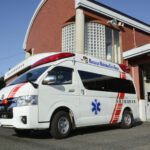Ambulance service in Japan is a responsibility of the Fire Department.
The number to call for an ambulance is 119.
When you call, the operator will ask you a few questions to assess the situation and send an ambulance. But it is important that you know the address of where you are. If you don’t speak Japanese, ask someone who does, but if there is no such person it is important that you learn the following dialogue:
119 ATTENDANT
IN JAPANESE – 119.消防です。火事ですか、救急ですか?
IN ROMAN – 119. Shobou desu. Kaji desu ka? Kyukyu desuka? Kyukyu desuka?
Translation – 119. It’s the Fire Department. Is it a fire or a medical emergency?
Answer
IN JAPANESE – 救急です
IN ROMAN – Kyukyu desu
TRANSLATION – It’s a medical emergency
Then tell where you are. If you don’t know, describe a nearby building or intersection as a reference point.
119 ATTENDANT
IN JAPANESE – 住所(場所)は どこですか?
IN ROMAN – jyusho (basho) wa dokodesuka?
TRANSLATION – What is the address (location) of the emergency?
Answer
IN JAPANESE – 住所は◯◯◯です
IN ROMAN – jyusho wa (address where you are) desu
TRANSLATION – The address is (address where you are). Example: Bunkyo-ku.
Then the attendant will ask you what happened, or your symptoms.
119 ATTENDANT
IN JAPANESE – どうしましたか?
IN ROMAN – Dou shimashita ka?
What happened?
Then tell what happened or what your symptoms are and when they started.
Answer
IN JAPANESE – 胸が痛いです
IN ROMAN – Mune ga itai desu.
I have chest pain
The attendant will ask your age, or if you are not the patient but are calling for someone else, tell the attendant how old he/she is or appears to be.
119 ATTENDANT
IN JAPANESE – 年齢は?
IN ROMAN – Nenrei wa?
How old are you?
Answer
IN JAPANESE – 30歳です
IN ROMAN – sanjyu sai desu
TRANSLATION – I’m 30 years old
Attendant will ask for your name and contact information
119 ATTENDANT
IN JAPANESE – あなたの名前と連絡先を教えてください
IN ROMAN – anata no namae to renraku saki wo oshiete kudasai
TRANSLATION – Please state your name and phone number
Answer your name and phone number, the attendant can contact you even when the call is over.
Name
IN JAPANESE – 私の名前は◯◯◯です
IN ROMAN – watashi no namae wa ◯◯◯ desu
TRANSLATION – My name is ◯◯◯
Phone
IN JAPANESE – 電話番号は◯◯◯です
IN ROMAN – Denwa bangou wa◯◯◯ desu
TRANSLATION – My phone number is◯◯◯
After this information, the attendant may ask more questions about you or the patient’s medical condition. Give him as much information as possible.
The flow illustrated above is one of the most common cases of communication with “119” operators.
But if it is not an emergency?
If the situation is not serious and you have questions, then call:
#7119
You are calling the “Emergency and Safety Center Project”
If you have a sudden injury or illness, and can’t decide whether it’s better to call an ambulance or go to the hospital now.
In that case, call the Emergency and Safety Center (#7119) , which acts as a telephone consultation desk where you can get specialist advice.
For consultations received #7119, doctors, nurses and counselors will listen to you to understand the symptoms of the illness and its injuries, and decide with you to call an ambulance or go to a nearby hospital, or a medical facility where you can visit.
Source: FDMA




